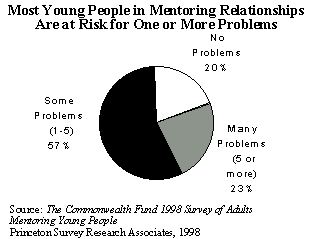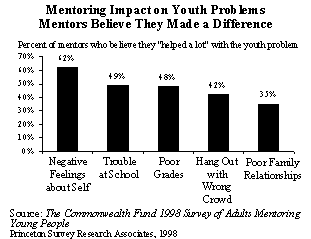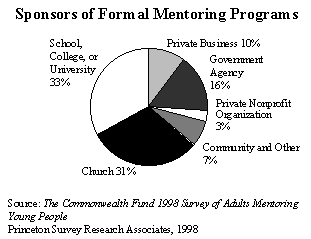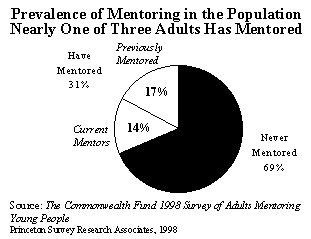The first nationwide survey to examine the practice of mentoring young people finds that nearly one of three adults (31%) has mentored a young person at some point and one of seven, or 27 million adults, is currently a mentor. These adults are volunteering to provide, on a regular basis, support and guidance in academic and personal areas of the life of a child other than their own.
The Commonwealth Fund 1998 Survey of Adults Mentoring Young People offers the first national overview of the experiences of mentors and profile of youths in mentoring relationships. Conducted by Princeton Survey Research Associates, Inc., the nationwide survey included 1,504 adults age 18 or older who reported mentoring a youth other than their own child during the past five years. The survey also included short interviews with a national sample of all adults to determine the extent of mentoring nationally and to enable comparisons between adults who have and have not mentored. Findings from the survey will be reported at a national symposium entitled "The State and Future of Mentoring," to be held Friday in Washington, D.C.
Mentoring is reaching at-risk youth. Mentor reports show that young people involved in mentoring relationships are often growing up in difficult circumstances and facing personal problems that could hinder their maturation into healthy and productive adults. "A significant number of young people in mentoring relationships are dealing with what may be overwhelming or potentially serious problems," said Karen Davis, president of The Commonwealth Fund. "These are children who can really benefit from a caring, understanding adult who is able to give them advice and support."

Nearly half (45%) live in families struggling financially, and nearly one of three (32%) has a parent who has a substance abuse or mental health problem or has had trouble with the law or experienced domestic violence. Four of five youths in mentoring have one or more of 12 problems investigated by the survey, including negative feelings about themselves, troubled family relationships, low grades, and getting into trouble in and out of school. Nearly one of four youths being mentored (23%) has five or more problems.
The large majority of mentors (85%) believe that mentoring has helped youths with at least some of their more serious problems. Mentoring has been particularly effective in helping youths who are at risk due to negative feelings about themselves, poor performance or trouble in school, substance abuse, and physical or sexual abuse.

"An adult who can provide regular support and guidance to a young person can help him or her develop confidence and competence," said Kathryn Taaffe McLearn, assistant vice president at the Fund. "Mentoring holds impressive potential to help youth grow up to be successful in the workplace and their communities. This potential is just beginning to be realized."
The survey finds that the vast majority of mentors (83%) who have mentored in the past five years have done so through informal connections in their neighborhoods, families, or church. About one of seven mentors (17%) has been part of a formal, structured program. Mentors in these formal programs report a wide variety of organizational sponsors. Local university, school, and church programs dominate: two of three mentors who have participated in formal programs said these were sponsored by a school, college, or university (33%) or a church (31%).

Adults in formal and informal mentoring relationships report strikingly similar activities and experiences. Analysis of these relationships finds that those that endured at least two years and included a wide variety of activities with youth achieved greater success in helping the young person deal with or prevent problems. Youths in severely difficult circumstances also appeared to benefit from having a mentor age 50 or older, and from meeting others through mentors who provide career or academic support.
Mentors find the experience highly satisfying, and most say they would mentor again and recommend that a friend become a mentor. Four of five mentors report they learned from the experience.
"We must put what we've learned about mentoring into action," said Gary Walker, president of Public/Private Ventures, a nonprofit corporation working to analyze and develop private and public sector initiatives to help young people, which conducted an important analysis of Big Brothers/Big Sisters' mentoring programs. "We hope more adults will become interested in mentoring once they know how rewarding it is—for both the mentor and the young person."
Mentoring is making a difference in the lives of many young people and their adult mentors. The challenge now is to reach a larger proportion of youth at risk by recruiting more adults to share their time, experience, and compassion with a young person.
"America's youth express a serious longing for more regular contact with adults who care about and respect them, and greater access to constructive and attractive alternatives to the loneliness that so many now experience," said Hugh Price, president of the National Urban League. "Mentoring is an effective way to reach young people who yearn for the guidance of caring adults."






